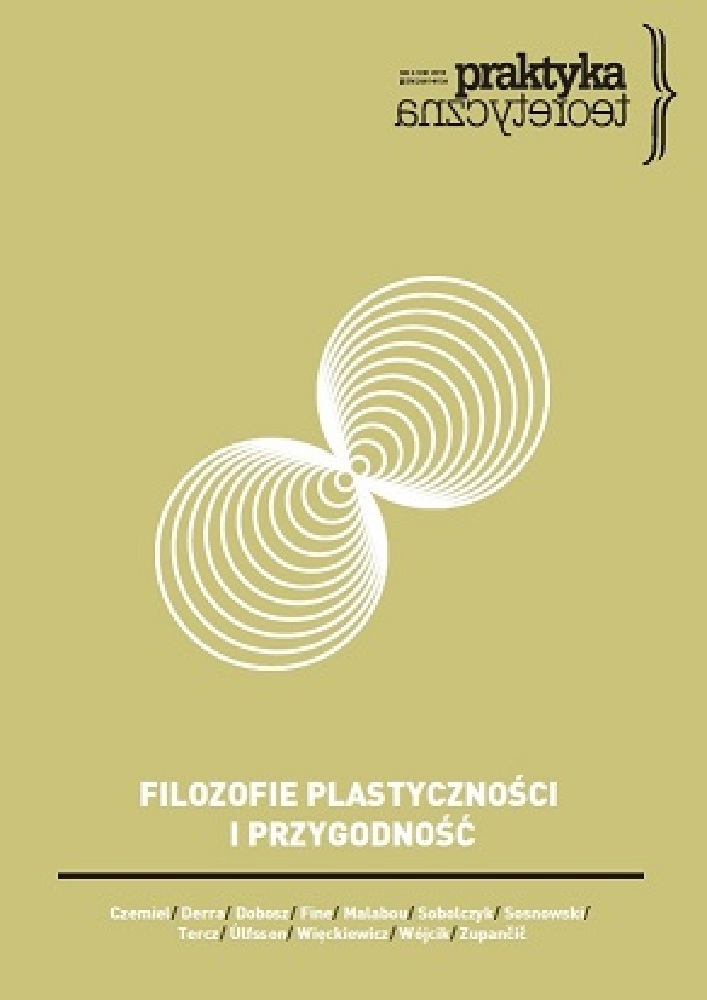Abstract
The dialectical concept of revolution emphasizes its dual character. Both in the conservative (de Tocqueville) and socialist (Lukács) versions, the revolution is a testimony to historical continuity and at the same time its violent rupture. The purpose of this essay is to capture this ambiguous phenomenon using Catharine Malabou’s concept of plasticity. Plasticity, as a contemporary, post-deconstructive formula of the Hegelian Aufhebung, is passive/active formation, destruction of form and its preservation at the same time. Its essence is the same as the essence of revolution, both in the writings of de Tocqueville and Lukács. However, such ambiguity of the revolution can be interpreted as an expression of its defeat. Its entanglement in the past condemns it to unproductive opportunism, its connection with the future - to empty messianism, and the search for mediation between these extremes seems to be endless. And if postmodernity is troubled by this fiasco, then at least one aspect of the idea of revolution triumphs - a certain way of thinking about it, speculation or dialectics as such.References
Barut, Andrzej. 2008. Tradycja i rewolucja. Konserwatyzm immanentny Josepha de Maistre’a. Wrocław: Wydawnictwo Uniwersytetu Wrocławskiego.
Comay, Rebecca. 2011. Mourning Sickness. Hegel and the French Revolution. Stanford: Stanford University Press.
Hegel, Georg Wilhelm Friedrich. 2002. Fenomenologia ducha. Tłum. Światosław Florian Nowicki. Warszawa: PWN.
Hegel, Georg Wilhelm Friedrich. 1994, Wykłady z historii filozofii. Tom 1. Tłum. Światosław Florian Nowicki. Warszawa: PWN.
Hegel, Georg Wilhelm Friedrich. 2007. Wykłady z filozofii religii. Tom 2. Tłum. Światosław Florian Nowicki. Warszawa: PWN.
Heidegger, Martin. 2005. Bycie i czas. Tłum. Bogdan Baran. Warszawa: PWN.
Heidegger, Martin. 1997. Heglowskie pojęcie doświadczenia. Tłum. Robert Marszałek. W Martin Heidegger. Drogi lasu. Warszawa: Aletheia.
Hobsbawm, Eric, 2013. Wiek rewolucji 1789–1848. Tłum. Katarzyna Gawlicz i Marcin Stranawski. Warszawa: Wydawnictwo Krytyki Politycznej.
Martinon, Jean-Paul. 2007. On Futurity. Malabou, Nancy, Derrida. London: Palgrave MacMillan.
Kuź, Michał. 2016. Alexis de Tocqueville’s Theory of Democracy and Revolutions. Warszawa: Oficyna Wydawnicza Uczelni Łazarskiego.
Lopez, Daniel. 2014. „Georg Lukács’s Theory of Revolution”. Marxist Left Review 8. http://marxistleftreview.org/index.php/no8-winter-2014/113-georg-lukacss-theory-of-revolution
Löwy, Michael. 1979. Georg Lukács – From Romanticism to Bolshevism. Tłum. Patrick Camiller. London: New Left Books.
Lukács, György. 1988. Historia i świadomość klasowa. Tłum. Marek J. Siemek. Warszawa: PWN.
Lukács, György. 1984. Wprowadzenie do ontologii bytu społecznego. Tom 2/1. Tłum. Kazimierz Ślęczka. Warszawa: PWN.
Lukács, György. 1985. „Bolszewizm jako problem moralny”. Tłum. Kazimierz Ślęczka. W Bogusław Jasiński. Lukács. Warszawa: Wiedza Powszechna.
Lukács, György. 1985. „Taktyka i etyka”. Tłum. Kazimierz Ślęczka. W Bogusław Jasiński. Lukács. Warszawa: Wiedza Powszechna.
Maistre de, Joseph. 2011. Wieczory petersburskie. O doczesnym panowaniu opatrzności. Tłum. Marta Bucholc, Warszawa: Wydawnictwa Uniwersytetu Warszawskiego.
Malabou, Catherine. 2005. The Future of Hegel. Plasticity, Temporality and Dialectics. Tłum. Lisabeth During. London–New York: Routledge.
Malabou, Catherine. 2010. Plasticity at the Dusk of Writing. Tłum. Carolyn Shread. New York: Columbia Univeristy Press.
Malabou, Catherine. 2017. Ontologia przypadłości. Esej o plastyczności destrukcyjnej. Tłum. Piotr Skalski. Warszawa: Fundacja Augusta hr. Cieszkowskiego.
Tocqueville de, Alexis. 1987. Wspomnienia. Tłum. Aleksander Wit Labuda. Wrocław: Zakład Narodowy im. Ossolińskich.
Tocqueville de, Alexis. 2005. Dawny ustrój i rewolucja. Tłum. Hanna Szumańska-Grossowa. Warszawa: Aletheia.
License
“Theoretical Practice” seeks to put into practice the idea of open access to knowledge and broadening the domain of the commons. It serves the development of science, thinking and critical reflection. The journal is published in open-access mode under the CC-BY-NC-SA 4.0 license (detail available here: http://creativecommons.org/licenses/by-nc-sa/4.0/). Articles published in the journal may be freely distributed, stored, printed and utilized for academic and teaching purposes without restrictions.
They should not be, however, used for any commercial purposes or be reconstructed into derivative creations. Access to the journal may not be limited or offered for a fee by any third party.
Prospective authors are obliged to fill in, sign and send back the publishing contract compliant with the CC licencing. [PL.pdf, PL.doc, EN.pdf,EN.doc].
According to this contract, authors grant the journal a non-exclusive right to publish their work under the creative commons license (CC-BY-NC-SA 4.0) without any financial obligation on both sides of the contract.
Before submission authors should make sure that derivative materials they use are not protected by copyright preventing their non-commercial publication. Authors are responsible for any respective copyright violations.
